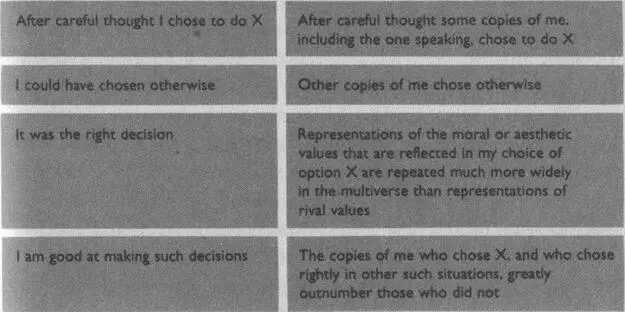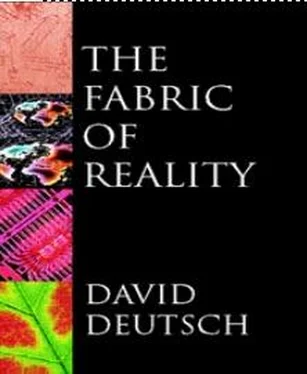David Deutch - The Fabric of Reality
Здесь есть возможность читать онлайн «David Deutch - The Fabric of Reality» весь текст электронной книги совершенно бесплатно (целиком полную версию без сокращений). В некоторых случаях можно слушать аудио, скачать через торрент в формате fb2 и присутствует краткое содержание. ISBN: , Жанр: Физика, Философия, на английском языке. Описание произведения, (предисловие) а так же отзывы посетителей доступны на портале библиотеки ЛибКат.
- Название:The Fabric of Reality
- Автор:
- Жанр:
- Год:неизвестен
- ISBN:0-7139-9061-9
- Рейтинг книги:4 / 5. Голосов: 2
-
Избранное:Добавить в избранное
- Отзывы:
-
Ваша оценка:
- 80
- 1
- 2
- 3
- 4
- 5
The Fabric of Reality: краткое содержание, описание и аннотация
Предлагаем к чтению аннотацию, описание, краткое содержание или предисловие (зависит от того, что написал сам автор книги «The Fabric of Reality»). Если вы не нашли необходимую информацию о книге — напишите в комментариях, мы постараемся отыскать её.
The Fabric of Reality — читать онлайн бесплатно полную книгу (весь текст) целиком
Ниже представлен текст книги, разбитый по страницам. Система сохранения места последней прочитанной страницы, позволяет с удобством читать онлайн бесплатно книгу «The Fabric of Reality», без необходимости каждый раз заново искать на чём Вы остановились. Поставьте закладку, и сможете в любой момент перейти на страницу, на которой закончили чтение.
Интервал:
Закладка:
What is my evidence? I have already presented some of it in Chapter 8, where I discussed the multiverse view of knowledge. Although we do not know what consciousness is, it is clearly intimately related to the growth and representation of knowledge within the brain. It seems unlikely, then, that we shall be able to explain what consciousness is, as a physical process, before we have explained knowledge in physical terms. Such an explanation has been elusive in the classical theory of computation. But, as I explained, in quantum theory there is a good basis for one: knowledge can be understood as complexity that extends across large numbers of universes.
Another mental attribute that is somehow associated with consciousness is free will. Free will is also notoriously difficult to understand in the classical world-picture. The difficulty of reconciling free will with physics is often attributed to determinism, but it is not determinism that is at fault. It is (as I have explained in Chapter 11) classical spacetime. In spacetime, something happens to me at each particular moment in my future. Even if what will happen is unpredictable, it is already there, on the appropriate cross-section of spacetime. It makes no sense to speak of my ‘changing’ what is on that cross-section. Spacetime does not change, therefore one cannot, within spacetime physics, conceive of causes, effects, the openness of the future or free will.
Thus, replacing deterministic laws of motion by indeterministic (random) ones would do nothing to solve the problem of free will, so long as the laws remained classical. Freedom has nothing to do with randomness. We value our free will as the ability to express, in our actions, who we as individuals are. Who would value being random? What we think of as our free actions are not those that are random or undetermined but those that are largely determined by who we are, and what we think, and what is at issue. (Although they are largely determined, they may be highly unpredictable in practice for reasons of complexity.)
Consider this typical statement referring to free will: ‘After careful thought I chose to do X; I could have chosen otherwise; it was the right decision; I am good at making such decisions.’ In any classical world-picture this statement is pure gibberish. In the multiverse picture it has a straightforward physical representation, shown in Table 13.1. (I am not proposing to define moral or aesthetic values in terms of such representations; I am merely pointing out that, thanks to the multiverse character of quantum reality, free will and related concepts are now compatible with physics.)
Thus Turing’s conception of computation seems less disconnected from human values, and is no obstacle to the understanding of human attributes like free will, provided it is understood in a multiverse context. The same example exonerates Everett’s theory itself. On the face of it, the price of understanding interference phenomena is to create or exacerbate many philosophical problems. But here, and in many other examples I have given in this book, we see that the very opposite is the case. The fruitfulness of the multiverse theory in contributing to the solution of long-standing philosophical problems is so great that it would be worth adopting even if there were no physical evidence for it at all. Indeed, the philosopher David Lewis, in his book On the Plurality of Worlds, has postulated the existence of a multiverse for philosophical reasons alone.

TABLE 13.1 Physical representations of some statements referring to free will.
Turning again to the theory of evolution, I can similarly attribute some sense to those who criticize Darwinian evolution on the grounds that it seems ‘unlikely’ that such complex adaptations could have evolved in the given time. One of Dawkins’ critics wants us to be as surprised by the biosphere as we would be if a heap of spare parts thrown together happened to fall into the pattern of a Boeing 747. On the face of it, this critic is forcing an analogy between, on the one hand, billions of years of planet-wide trial and error, and on the other hand an instantaneous accident of ‘happening to fall together’. That would be wilfully to miss the whole point of the evolutionary explanation. Nevertheless, is Dawkins’ precisely opposite position completely adequate as an explanation? Dawkins wants us not to be surprised that complex adaptations have come into being spontaneously. In other words, he is claiming that his ‘selfish gene’ theory is a full explanation — not of course for specific adaptations, but of how it was possible for such complex adaptations to come into being.
But it is not a full explanation. There is an explanatory gap, and this time we already know much more about how the other strands could fill it. We have seen that the very fact that physical variable can store information, that they can interact with one another to transfer and replicate it, and that such processes are stable, all depend on the details of quantum theory. Furthermore, we have seen that the existence of highly adapted replicators depends on the physical feasibility of virtual-reality generation and universality, which in turn can be understood as consequences of a deep principle, the Turing principle, that links physics and the theory of computation and makes no explicit reference to replicators, evolution or biology at all.
An analogous gap exists in Popperian epistemology. Its critics wonder why the scientific method works, or what justifies our reliance on the best scientific theories. This leads them to hanker after a principle of induction or something of the sort (though, as crypto-inductivists, they usually realize that such a principle would not explain or justify anything either). For Popperians to reply that there is no such thing as justification, or that it is never rational to rely on theories, is to provide no explanation. Popper even said that ‘no theory of knowledge should attempt to explain why we are successful in our attempts to explain things’ ( Objective Knowledge p. 23). But, once we understand that the growth of human knowledge is a physical process, we see that it cannot be illegitimate to try to explain how and why it occurs. Epistemology is a theory of (emergent) physics. It is a factual theory about the circumstances under which a certain physical quantity (knowledge) will or will not grow. The bare assertions of this theory are largely accepted. But we cannot possibly find an explanation of why they are true solely within the theory of knowledge per se. In that narrow sense, Popper was right. The explanation must involve quantum physics, the Turing principle and, as Popper himself stressed, the theory of evolution.
The proponents of the prevailing theory, in each of the four cases, are put permanently on the defensive by their critics’ harping on these explanatory gaps. This often forces them to retreat into the core of their own strand. ‘Here I stand, I can do no other’ is their ultimate response, as they rely on the self-evident irrationality of abandoning the unrivalled fundamental theory of their own particular field. This only makes them seem even more narrow to the critics, and it tends to engender pessimism about the very prospect of further fundamental explanation.
Despite all the excuses I have been making for the critics of the central theories, the history of all four strands shows that something very unpleasant happened to fundamental science and philosophy for most of the twentieth century. The popularity of positivism and of an instrumentalist view of science was connected with an apathy, loss of self-confidence and pessimism about genuine explanations at a time when the prestige, usefulness and, indeed, funding for fundamental research were all at an all-time high. Of course there were many individual exceptions, including the four heroes of this chapter. But the unprecedented manner in which their theories were simultaneously adopted and ignored speaks for itself. I do not claim to have a full explanation for this phenomenon, but whatever caused it, we seem to be coming out of it now.
Читать дальшеИнтервал:
Закладка:
Похожие книги на «The Fabric of Reality»
Представляем Вашему вниманию похожие книги на «The Fabric of Reality» списком для выбора. Мы отобрали схожую по названию и смыслу литературу в надежде предоставить читателям больше вариантов отыскать новые, интересные, ещё непрочитанные произведения.
Обсуждение, отзывы о книге «The Fabric of Reality» и просто собственные мнения читателей. Оставьте ваши комментарии, напишите, что Вы думаете о произведении, его смысле или главных героях. Укажите что конкретно понравилось, а что нет, и почему Вы так считаете.












